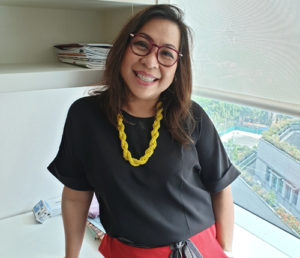Ipas Indonesia Country Director Marcia Soumokil shares her abortion experience
Ipas Indonesia Country Director Marcia Soumokil has always had a passion for women’s health. Before joining Ipas in 2017, Dr. Soumokil worked as a general practitioner, for a reproductive health program for female refugees, and with an HIV organization. Her own abortion experience more than 12 years ago gave her new perspective on how important it is for women to have access to a full spectrum of health services, including safe abortion.

When Soumokil learned she was five weeks pregnant, she already had two young children. “Both my husband and I decided that we could not keep the pregnancy; we were already very occupied with our two children,” she says.
Soumokil and her husband went to her OB-GYN, who had helped deliver their son. When they said they wanted to terminate the pregnancy, the doctor gave them a long, admonishing speech that included bible verses. But they still wanted to terminate the pregnancy and asked for a referral. The OB-GYN refused, noting it in Soumokil’s medical record and telling her that—since he was the hospital’s head OB-GYN—no other doctor there would help her, either.
Soumokil was on her own, needing an abortion in a country where it was restricted except to save a woman’s life. A friend told her about a clinic that operated under a loophole: It provided abortion only to married women in cases of “contraception failure” (the justification being that “if you’re married and have an unwanted pregnancy, it’s definitely because contraception failed”). The clinic was hard to find, and Soumokil and her husband were led astray by a broker, who took them to what looked like “an abandoned house,” with overgrown grass, faded paint and ripped black plastic covering the windows, she recounts.
Seeing the dilapidated building, Soumokil said to her husband, “Turn around. I don’t want to die from infection here.” The broker chased Soumokil and her husband down the street, demanding to know why they were leaving. “I’m a medical doctor—I should have had better access, better information, but even I didn’t,” Soumokil said. “How many other people become the victim of this kind of manipulation?”
Soumokil did find the clinic her friend had mentioned. Before the procedure, she sat in a cramped waiting room with 30 other women. The clinic provided no counseling or information. But after her abortion, Soumokil felt relief. At the time, she didn’t consider possible legal repercussions, though she later realized that she, her husband and the provider could have gone to jail. “I was so eager to terminate the pregnancy—we weren’t thinking further,” she says.
She didn’t share her story for years, because “the way I was rejected—the way people treated me—it made me really embarrassed to tell my story,” she says. “Not many people want to talk about their experiences with these kinds of things. But no woman should feel embarrassed for sharing her decision.”
Now, she proudly works to reduce the number of “women who have to go through my experience. And to make sure that when the service is there, it’s a quality service.”
For more information, contact [email protected].


